- Home
- Charles de Lint
Forests of the Heart Page 7
Forests of the Heart Read online
Page 7
“I needed to come up for air,” Ellie said. “How’d you know I needed a break?”
Donal shrugged and toed off his boots, one by one. They immediately began to work at forming a new puddle around themselves.
“You know me,” he said. “I know all and see all, like the wild-eyed Gaelic fortune-teller that I am. It’s bloody depressing, I tell you. Takes all the mystery out of life.”
Ellie rolled her shoulder muscles again. “I’d much prefer it if you’d suddenly decide to become a masseur,” she told him. “One who desperately needs someone to practice on.”
“It’ll never happen,” he said, passing over a paper bag with grease stains on the bottom. “Mostly because it’d take far more energy than I could ever muster.” He shed his pea jacket and dropped it against the wall by the door. “Instead, I’ve got these chocolate croissants and I was hoping to find someone to help me eat them. Would you have any coffee?”
Ellie glanced at her coffee maker and pulled a face. “Let me put on a fresh pot. That stuff’s been sitting there all day now.”
Donal followed her to the kitchen area, marked off from the rest of the loft by a kitchen table and chairs set up close to a large industrial steel sink, a long counter and the pair of old appliances that had come with the place: a bulky fridge and an equally stout stove, both dating back to the sixties. He settled in one of the chairs by the table while Ellie ground some fresh beans for the coffee maker.
“So I heard you were a bit of the hero last night,” he said.
Ellie turned to look at him. “Who told you that?”
“Tommy. I ran into him at the Dear Mouse Diner when I was having breakfast this morning with Sophie and Jilly.”
“God, what was he doing up at that time? We didn’t get the van back to Angel’s until six-thirty.”
“I don’t think he’d been to bed yet,” Donal said.
Ellie shook her head. “We have such weird schedules. It’s a wonder we can still function.”
“And you’re avoiding the subject. That was a good thing you did. Take the compliment, woman. We’re all proud of you.”
Ellie finished pouring water into the coffee maker. Turning it on, she joined Donal at the table.
“It was pretty yucky,” she said. “I don’t know what he’d choked on but it took me forever to get the taste of his vomit out of my mouth.” She looked at the bag of croissants that he’d brought. “And doesn’t that little thought do wonders for the appetite.”
“Sorry I mentioned it.”
“Don’t be.”
But she still wanted to go rinse her mouth out with mouthwash again.
“So your man’s doing fine?” Donal asked.
Ellie nodded. “I called the hospital to check on him before I went to bed this morning.” She paused, then added, “It’s weird. When Angel had us all taking that CPR course, I didn’t think I’d remember any of it. But when it was actually happening, it was like I went into automatic. I didn’t even have to think about it.”
Donal slipped into a broader Irish accent. It was easy for him to do, seeing how he’d been born and lived half his life over there. “Sure, and wouldn’t that be the whole point of the course?”
“I guess.”
Thinking about last night made Ellie remember the man who was actually a woman with her silver flask filled with Welsh whiskey.
“Have you ever tried metheglin?” she asked. “It’s this—”
“Oh, I know what it is. Miki has a friend who makes it. Not quite Guinness, mind you, but it’ll do. Bloody strong bit of the gargle. Sneaks up and gives you a kick like poteen.”
Ellie nodded, remembering how the liquor had made her eyes tear last night.
“Where did you have it?” Donal asked.
The coffee was ready, so over steaming mugs and croissants, Ellie gave him a rundown of the previous night’s events, finishing up with the woman she’d met while Tommy had been talking to the police.
“I would have thought she was a man, if it hadn’t been for Tommy,” she said.
“It’s like one of those old ballads,” Donal said. “You know, where your man finds out his cabin boy’s really a woman. I wonder what she’s hiding from?”
“Who knows? In this city, I’m not sure I even want to know.”
Donal shook her head. “Jaysus, where’s your sense of mystery? Maybe she’s a deposed, foreign princess and all she has left of her former life is that silver flask. She’d be carrying herself with a tragic air, am I right?”
“Hardly.”
“Fair enough. So she’s learned to hide it well. To live with her disappointments. To put the past aside and get on with her life.”
Ellie sighed. “You know, the way you and Jilly can carry on you’d think every street person is some charming eccentric, or basically a sweet and kind person who’s only had a bit of bad luck. But it doesn’t work that way. They need our sympathy, sure, and we should try to help them all we can, but some of them are mean-spirited and some of them are dangerous and some of them would be screwed up no matter where you found them. I don’t think it helps anything to pretend differently.”
“Yes, but—”
“I work with them almost every day and they’re just people, Donal. More messed up than some of us, and certainly more unlucky. And if some of them choose to live the way they do, it’s not because they have some romantic story hidden in their past. It’s because they’re kids whose home lives were so awful they prefer to live in the different kind of hell that’s the streets. Or they’re schizophrenics who can’t get, or won’t take, their medicine. They’re alcoholics, or junkies, or on the run, or all of the above and then some. And the world they live in isn’t safe. It’s more dangerous than anything we can imagine. We go into it, but we can step back out whenever we want. They can’t.”
“I know,” Donal said, his voice subdued.
Ellie sighed again, remembering that he’d suffered his own hard times, he and his sister Miki both, though they rarely spoke of those days. They hadn’t gone through one of Angel’s programs, but they’d still had to endure hunger and homelessness before they found a way out of the darkness.
“I’m sorry,” she said. “I didn’t mean to come off all high and mighty. It’s just… it breaks my heart sometimes because there’s so many of them and some of them are so young and we can’t even come close to reaching them.”
Donal reached across the table and gave Ellie’s hand a squeeze.
“I know that, too,” he said. “But I’m with Jilly on this one. We just like to see the magic in things, instead of focusing too much on the hurt of it all.”
“When you’re not pretending to be overcome by the doldrums.”
“Pretending?”
“Pretending,” Ellie said firmly. “And please. Magic?”
“Oh, not hocus-pocus, exactly. But you know, there’s magic everywhere you turn, if you pay attention to it. Little miracles like your being in the right place at the right time to give that man CPR and save his life. Or the way some old rubbie can turn out to be the most gifted storyteller. You can sit there with him on a bundle of newspapers in some alley, but when he starts to tell a story, it takes you a million miles away. And some of the street people really are unusual and mysterious—I mean, what better place to hide than in plain sight, on the streets with all the rest of the invisible people?”
This was about the one subject on which Donal could enthuse for hours. Even talking about his art rarely did away with the long face and the Eeyore voice.
“You’re beginning to sound like one of Tommy’s aunts,” she told him. “The mysterious and numerous Creek sisters.”
Donal smiled. “Grand women, all.”
“You’ve met them?”
“Sure,” Donal said. “You haven’t?”
“To tell you the truth, I wasn’t sure they really existed.”
“Well, I haven’t met them all,” Donal told her. “I mean, Tommy’s mother has … what? S
ixteen sisters? But they certainly exist. Let’s see. I met Sunday one time on the rez when I went up to a powwow with Tommy and Jilly. And then Conception and Serendipity always come to the bake sale at St. Vincent’s every spring. And Zulema’s been doing work with Native kids through Angel for years.” He paused and cocked his head. “What made you think they didn’t exist?”
“I don’t know,” Ellie said, feeling a little embarrassed now. “Their names. The way Tommy talks about them like they’re mythological figures.”
“Up on the rez, everybody sees them that way. They call them the Aunts and they go to them for medicines and stories and that sort of thing. Bloody miracle workers, they are.” He gave Ellie one of his rare grins. “And now that I think of it, Conception told me about a cure for sore muscles. I remember writing it down, but…” He pursed his lips, brow furrowing, then shook his head. “I can’t remember where I put it. But if you asked Tommy, he could get it from her.”
“Oh right. That’d be just what I need. He already passes along their little folk wisdoms at the drop of a hat.”
Donal gave her a considering look. “Which, I’m guessing, is still the sort of thing that makes you uncomfortable.”
“I’m as uncomfortable with it as you or Jilly are comfortable.”
Donal shook his head. “Now that’s extreme.”
“But true.”
On both sides, Ellie thought. She liked whimsy and magical things as much as the next person, but she kept it in perspective. One could read about it, or use it in one’s art without believing it was real. Donal was bad enough with his teasing tales of the little people and all, but when it came to Jilly, well, sometimes it seemed that Jilly lived in an entirely different world than the one that Ellie and the rest of the world did—a world where the headlines from supermarket tabloids were tangible possibilities rather than outright fiction. It came out in her paintings, which depicted fairyland creatures wandering through urban cityscapes, as well as in her conversation. The latter required only the smallest opening and Jilly would be away with wild theories, supposed true-life anecdotes and the like.
There were times when Ellie found this sort of thing maddening, but it was also part of Jilly’s charm, this fey streak she had and the ability to be so persuasive that, if it was late enough at night and you’d had enough glasses of wine, you could almost go along with her beliefs. You could almost accept that the world held not only what we all know it to hold, but also the fantastical tangents that people like Donal and Jilly almost seemed to draw into it, by their own absolute conviction, if nothing else.
“Okay,” Ellie said. “Since you like mysteries, what do you make of this?”
She went over to where her parka was hanging and fetched the business card she’d found on the dash of the van last night. Donal took it from her, his eyes filled with curiosity until he’d read the few words on it. Then he placed it on the table and gave Ellie a puzzled look.
“It’s a business card,” he said.
“Duh. I know that. But what does it mean?”
Donal glanced down at the card, then back at her, obviously confused. “Could you explain the question again?”
“Is that a person’s name, or the name of a business?” Ellie said. “And why isn’t there a phone number?”
He shrugged. “Maybe it’s like one of those Victorian calling cards that the Brits took around when they went visiting. Where did you get it?”
“I found it on the dash of the van last night—right after I met that strange woman.”
“And you think she left it?”
Ellie nodded. “But why?”
“Maybe she wants you to call her.”
“No phone number.”
“Fair enough.” Donal looked at the card again. “ ‘Handfast Road,’ “ he read. “That’d be up in the Beaches, I’m thinking, so it’ll be all bloody straight-laced and la-di-da except for…” His face brightened. “Kellygnow. The artists’ colony. Aren’t they on Handfast Road?”
“Let me check.”
Ellie found her telephone directory where it was half-hidden under a stack of art and design magazines and looked up Kellygnow.
“Here it is,” she said. “The Kellygnow Artists’ Community. 17 Handfast Road. There’s even a number.”
“There you go. Mystery solved. All you have to do is call up there and ask for Musgrave Wood.”
“I suppose. Have you ever been up there?”
“A long time ago, and then it was just to a couple of parties that Jilly was invited to. But you know. It’s not really our crowd.”
Ellie nodded. Kellygnow had a close association with the university, whereas she and Donal and their friends were more connected to the Newford School of Art, even though many of them had originally attended Butler U. Ellie had never been up to Kellygnow herself. And except for In the City’s mentioning who was taking up or leaving residence, she never really thought much about it at all. It was just one more place in a very big city.
“So?” Donal said. “Are you going to call?”
Ellie shook her head. “What would I say?”
“Maybe there’s a commission in it for you.”
“I doubt that. If the name of the woman I met last night is Musgrave Wood, and she does want to offer me a commission, don’t you think she would have said something when we were talking?”
But Donal wasn’t going to be easily dissuaded. “Well, maybe they’ve got an opening and want to know if you’d like to take up residence.”
“As if.”
Many of the most important and influential artists to come out of the Newford fine arts scene had spent some time in residence at Kellygnow— everyone from the late Vincent Rushkin, considered by many to be one of the great twentieth-century masters, to the watercolorist Jane Connelly whose art hung in galleries throughout the world. Ellie believed in her own work, but the caliber of artists in residence at Kellygnow at any given time was in a different class entirely.
“Then what are you going to do?” Donal asked.
“Nothing.”
While she could see Donal’s frustration, Ellie had no interest in following up on anything so tenuous.
“But aren’t you at least curious?” Donal asked. “I mean, Jaysus. It’s like a mysterious summons of some sort.”
Still Ellie wouldn’t be persuaded. “Of course I’m curious, but I don’t like mysteries.”
Donal nodded. He got up and refilled their coffee mugs.
“It’s your choice, of course,” he said as he returned to the table and spooned sugar into his coffee. He looked up, a sparkle in his eye. “But all the same. It seems like such a waste of a good mystery.”
“If someone up there really wants to contact me,” Ellie told him, “my number’s in the book.”
4
A wave of music, conversational noise, and hot, smoky air greeted Hunter when he pushed open the oak and glass front door of The Harp and stepped inside from the snowy street that evening. He looked around for a moment, blinking in the haze, then saw Miki waving to him. She sat with her brother Donal at a small table just at the edge of where a dozen or so musicians were playing, the session led by a red-haired woman playing the uilleann pipes who seemed familiar, but Hunter couldn’t remember her name. The other instrumentation was mostly fiddles, flutes, and whistles, but there were also a pair of mandolins, a guitar, bodhráns, and the inevitable tenor banjo playing too loud above it all.
The Harp was in the Rosses, once the predominantly Irish part of town, north of the Market in Crowsea. The oldest Irish pub in Newford, it had been a Catholic stronghold, and meeting place for homesick emigrants and IRA sympathizers, but its partisan loyalties were no longer in evidence. As the make-up of the neighborhood took on a more international flavor and the clientele had come to encompass all nationalities, religious and political differences among the pub’s Irish patrons had mostly been set aside in favor of the craíc—an Irish term that encompassed the shared enjoyment of good com
pany, good drink, and good music. Even the musicians were no longer exclusively of Irish descent. As Hunter made his way to the table where Miki and Donal were sitting, he noted a black man playing the tin whistle, a Jewish woman on the guitar, a young Asian man on fiddle—all three playing with the sensibility of having just stepped off the plane from Ireland.
The popularity of Celtic music didn’t surprise Hunter. There was something universal in its infectious dance tunes and mournful slow airs. He could hear echoes of it in everything from old timey and bluegrass to classical and the indigenous music of many other cultures. There was a purity in its cadences, a timelessness with which contemporary music couldn’t compete. He sometimes thought that the difference between the two was like the difference between North America and Europe: The landscape of each was as old as the other, but it felt older in Europe where churches, castles, even a cottage, could easily be six or seven hundred years old. As far as Western culture was concerned, North America hadn’t even existed until the last few hundred years and there were few pieces of architecture that could claim to be much more than a hundred years of age.
“You made it,” Miki said as he squeezed through the last dense press of bodies and tables and sat down in the chair she’d been saving for him. She grinned at him, obviously pleased.
“I said I would, didn’t I?”
“Yeah, but you’ve said it before.”
Hunter nodded. But that was before Ria had dumped him. She’d never cared much for Celtic music or the noisy sessions in The Harp—perhaps that should have rung a warning bell, he thought now—so he’d stopped coming to them. “You go on ahead,” she’d say when he’d suggest they drop by for a pint, but he never did. It didn’t feel the same going out to them on his own, leaving her behind.
Don’t go there, he told himself.
He was supposed to be trying to forget his problems, not brood on them. Yeah, right. But he could at least make an effort. So he turned to Miki’s brother.
“How’s it going?” he asked Donal.
The family resemblance wasn’t pronounced between Miki and her brother, though that had more to do with the sorts of people they were than genetics. Where Miki was a cheerful punkette, Donal had the look of an old, serious hippie—nevermind that he couldn’t have been much older than three and still living in Ireland during the Summer of Love. He was dark-haired and had a full beard, his long thick hair pulled back in a ponytail. His features were broader than Miki’s, though he wasn’t much taller than her. An often earnest gnome—or rather a leprechaun, perhaps—to her impish punk.

 Widdershins
Widdershins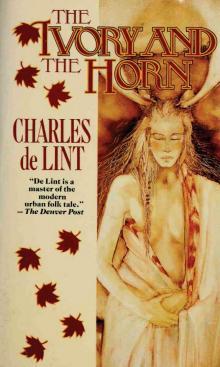 The Ivory and the Horn
The Ivory and the Horn Yarrow
Yarrow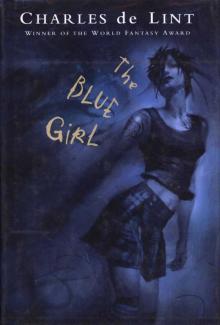 The Blue Girl
The Blue Girl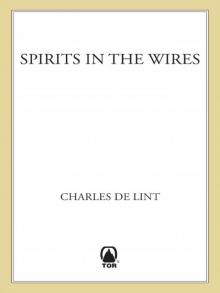 Spirits in the Wires
Spirits in the Wires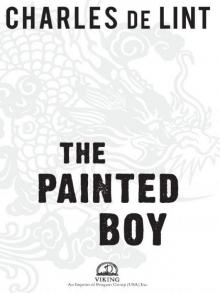 The Painted Boy
The Painted Boy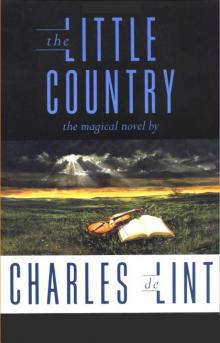 The Little Country
The Little Country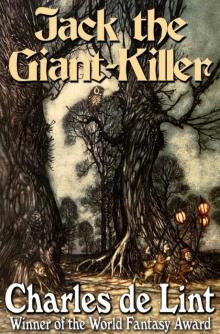 Jack of Kinrowan: Jack the Giant-Killer / Drink Down the Moon
Jack of Kinrowan: Jack the Giant-Killer / Drink Down the Moon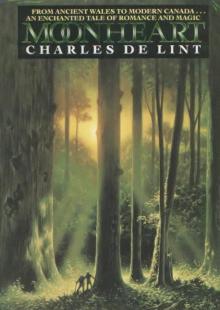 Moonheart
Moonheart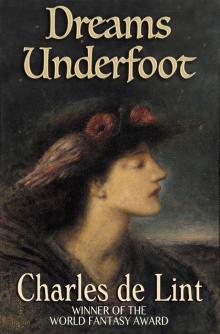 Dreams Underfoot
Dreams Underfoot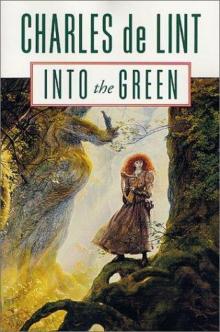 Into the Green
Into the Green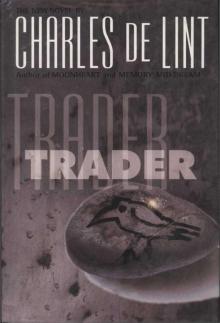 Trader
Trader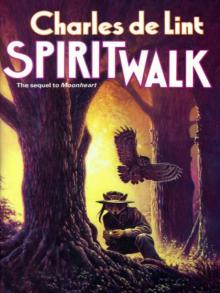 Spiritwalk
Spiritwalk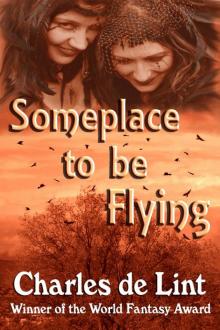 Someplace to Be Flying
Someplace to Be Flying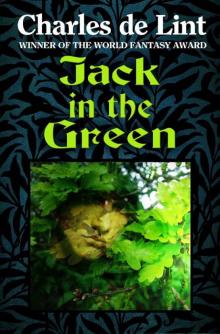 Jack in the Green
Jack in the Green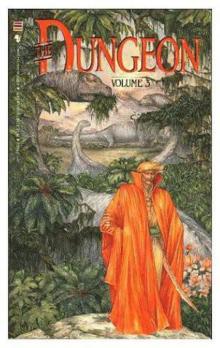 The Valley of Thunder
The Valley of Thunder Out of This World
Out of This World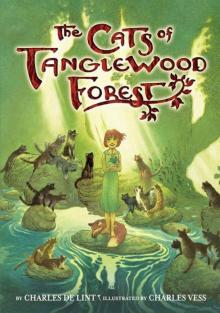 The Cats of Tanglewood Forest
The Cats of Tanglewood Forest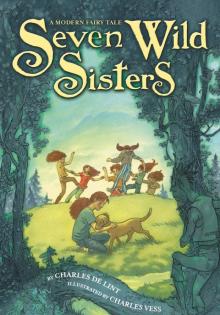 Seven Wild Sisters
Seven Wild Sisters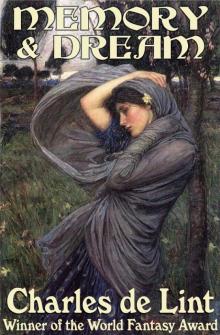 Memory and Dream
Memory and Dream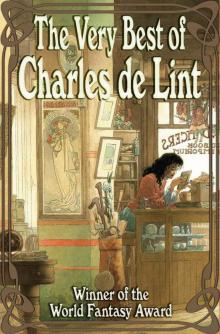 The Very Best of Charles De Lint
The Very Best of Charles De Lint Under My Skin
Under My Skin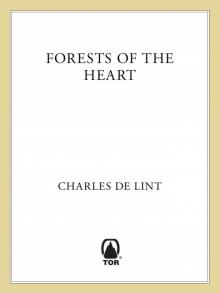 Forests of the Heart
Forests of the Heart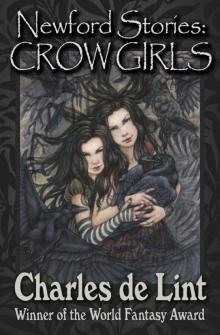 The Newford Stories
The Newford Stories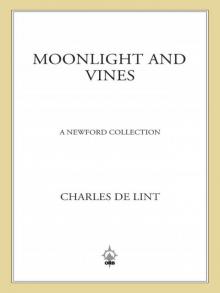 Moonlight and Vines
Moonlight and Vines Angel of Darkness
Angel of Darkness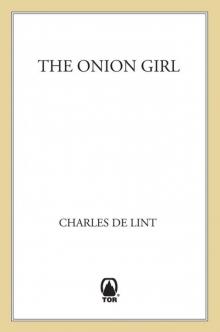 The Onion Girl
The Onion Girl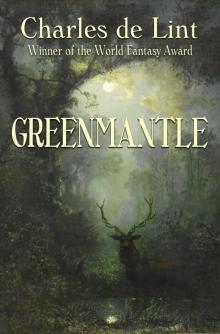 Greenmantle
Greenmantle Waifs And Strays
Waifs And Strays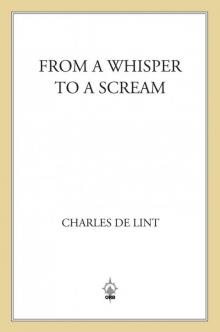 From a Whisper to a Scream
From a Whisper to a Scream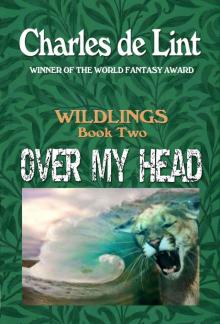 Over My Head
Over My Head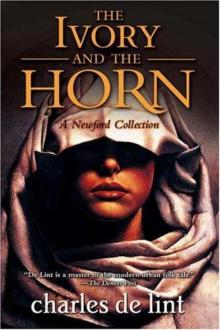 The Ivory and the Horn n-6
The Ivory and the Horn n-6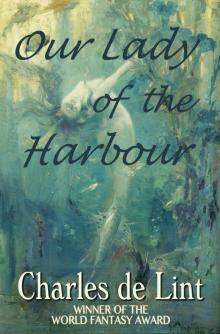 Our Lady of the Harbour
Our Lady of the Harbour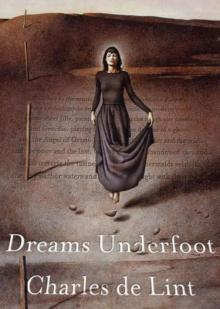 Dreams Underfoot n-1
Dreams Underfoot n-1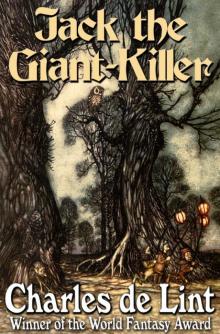 Jack the Giant-Killer (Jack of Kinrowan Book 1)
Jack the Giant-Killer (Jack of Kinrowan Book 1)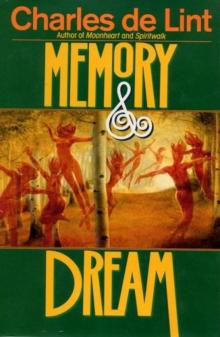 Memory and Dream n-5
Memory and Dream n-5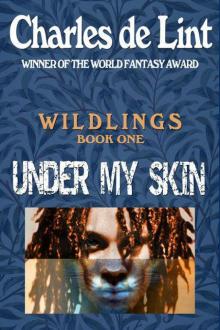 Under My Skin (Wildlings)
Under My Skin (Wildlings)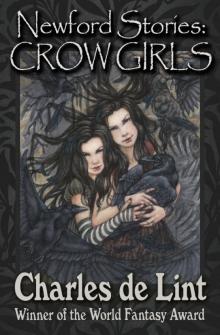 Newford Stories
Newford Stories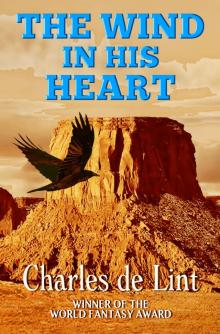 The Wind in His Heart
The Wind in His Heart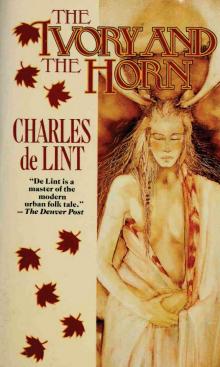 Ivory and the Horn
Ivory and the Horn